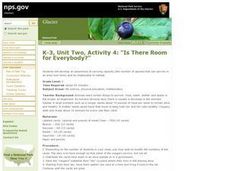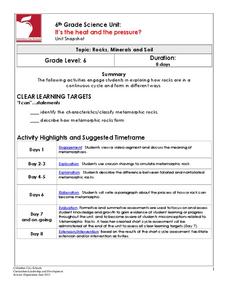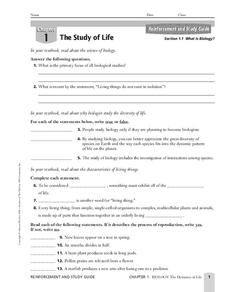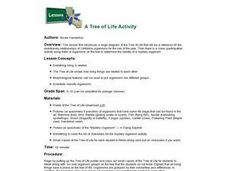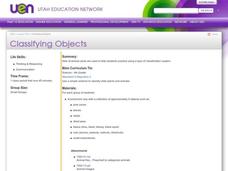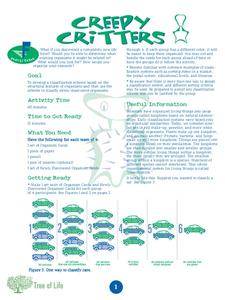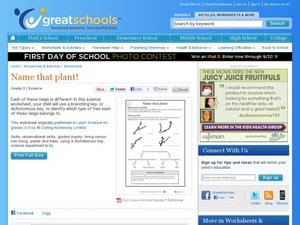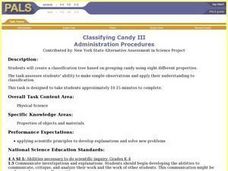Curated OER
Distinguishing Between Flowers
A branching key is a great way to classify different types of animals and plants! Fifth graders answer several yes/no answers about three different plants. They then create their own key to differentiate between an iris, a rose, and a...
Curated OER
Is There Room for Everybody?
Third graders examine the capacity of animals able to live in one habitat. In this habitat lesson, 3rd graders play a game that shows the food chain and the interactions between animals in an area. Students discover that food is a major...
Curated OER
Good Manners: Taxonomy Questions
In this good manners reading comprehension worksheet, students read a realistic story about the importance of good manners. Students then answer 30 taxonomy questions: synthesis, analysis, application, comprehension and evaluation.
Curated OER
Taxonomy and the World of Microorganisms and Viruses
In this taxonomy activity, learners understand how organisms are classified using Linnaeus' system. Students classify organisms as either plant or animal. This activity has 24 fill in the blank and 6 matching questions.
Curated OER
Introductory Bacteria and Virus Worksheet
Compare and contrast eukaryotes, prokaryotes, and viruses with a chart and a Venn diagram. Beginning microbiologists consider motility, reproductive ability, DNA content, and the presence of organelles. They write short answers to...
Perkins School for the Blind
Matching Like Objects
Same and different, sorting, and tactile discrimination are what's on the agenda for today. The class practices sorting objects and attempts to determine which objects are the same and different and why. The purpose is to increase...
Columbus City Schools
It's the Heat and the Pressure?
Ready for a change? Give a comprehensive collection of metamorphic materials a try! With the assortment of printables and lab activities, you won't be under pressure to keep things lively. The unit culminates by having pupils complete an...
Curated OER
Are You One Of Us?
Students discover how to classify things based on their similarities and differences. Students give the characteristics of insects and create a classification list. Given examples of various types of insects, students classify them...
Curated OER
Classified Information - Part 1: Shapes
Third graders investigate how and why scientists use classification. They discuss classification strategies using animals, and as a class fill in a flowchart with their responses. Next, in small groups they cut out a variety of shapes...
Curated OER
What is Biology?
In this science of biology worksheet, students will review the concepts relating to biology including the characteristics of living things, the process of reproduction, adaptations, and evolution. This worksheet has 5 short answer, 3...
Curated OER
Classification
In this biology worksheet, students identify and locate various vocabulary terms related to the classification of living things. There are 32 biology terms located in the word search.
Curated OER
Classifying Objects
Fourth graders classify living things according to similarities and differences through guided and independent activities. They place objects into groups according to their characteristics and then make a collage of living things...
Curated OER
Classifying "Pastanimals"
Students explore biology by creating a poster presentation. In this animal classification lesson, students utilize a SMART board and practice organizing a group of animal shapes by placing them with similar animal families. Students...
Curated OER
Classy
Students explore the classification system in this seven lessons unit. The diversity of life forms and their characteristics are examined using a microscope. Kingdoms, classes, and families are investigated.
Curated OER
Species Diversity and Phylogeny
Students explore the classification system of organisms: taxonomy. They examine prepared slides of Protozoans and record information on a Taxonomy Recording Sheet. Two additional classifying activities are also included in this lesson.
Curated OER
Diversity of Life
Students compare the different classifications and explore how organisms are grouped. In this classification lesson students study images of organisms and answer questions.
Curated OER
A Tree of Life Activity
High schoolers solve a mystery of the identification of a unknown organism by comparing its morphological characteristics to those in a tree of life classification poster. They compare the observable characteristics of the specimen and...
Curated OER
Classifying Objects
Fourth graders work in small groups to sort and classify a variety of objects. They develop criteria for sorting and explain the characteristics they chose for classification. Groups record and share their classifications.
Curated OER
Creepy Critters
Learners classify imaginary newly discovered organisms. In this classification lesson, students are given cards showing imaginary organisms that have been recently discovered. They must classify the organisms based on their characteristics.
Curated OER
Mammals Have Fur
First graders study animals. In this animal classification lesson, 1st graders explore the characteristics (primarily fur) that distinguish animals as mammals. They work in groups at various stations that practice this classification...
Curated OER
Classifying Classes
In this classifications worksheet, students add levels of classifications for humans by splitting them into smaller and smaller classes. Students add 5 new levels.
Curated OER
Name that plant!
What is a dichotomous key? When your kids ask, hand them a learning exercise like this one, to explain it. They use the key to identify four different trees, based on the budding twigs they've produced. Tip: Have learners extend this...
New South Wales Department of Education
Invertebrates
Of all invertebrates, insects by far are the most numerous. Scholars discuss invertebrates and then use a key to classify them. They see different examples and must describe features of each organism based upon the key.
Curated OER
Classifying Candy III
Students create a classification tree based on grouping candy with eight different properties. This allows students to understand how living things are classified.



